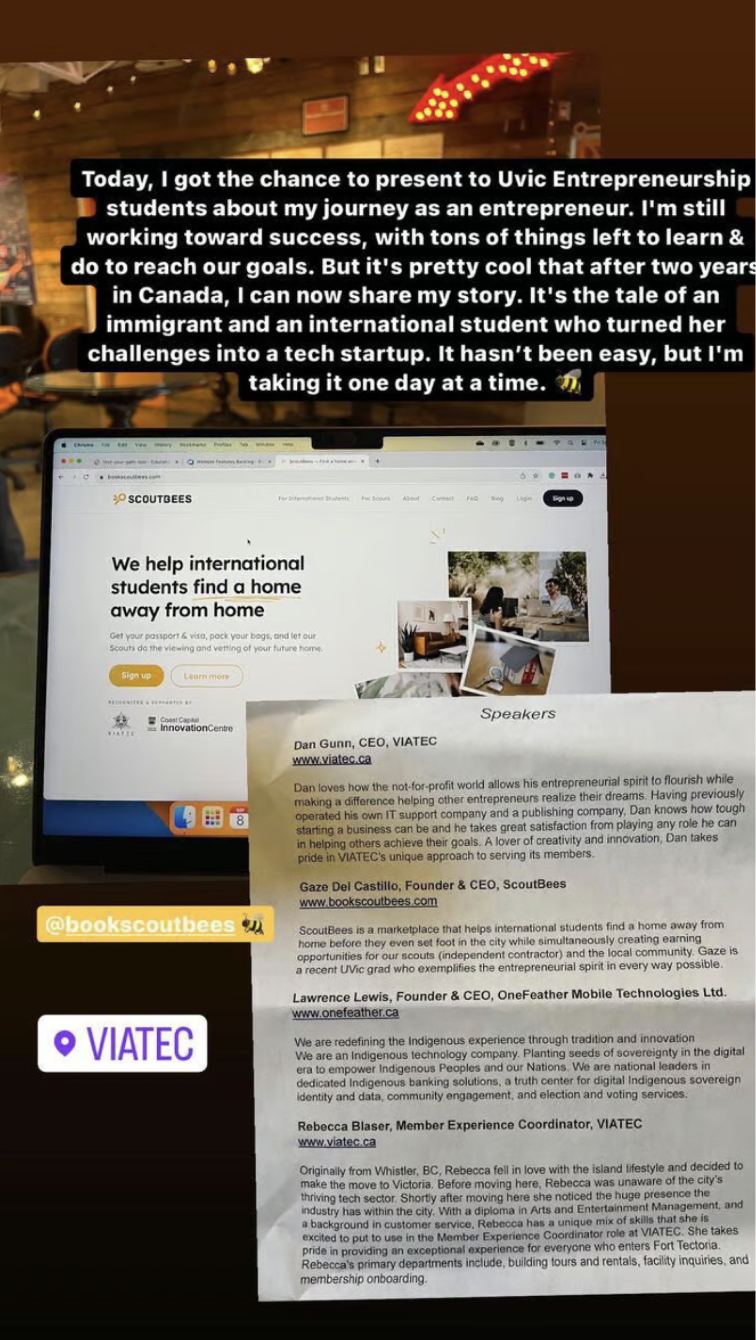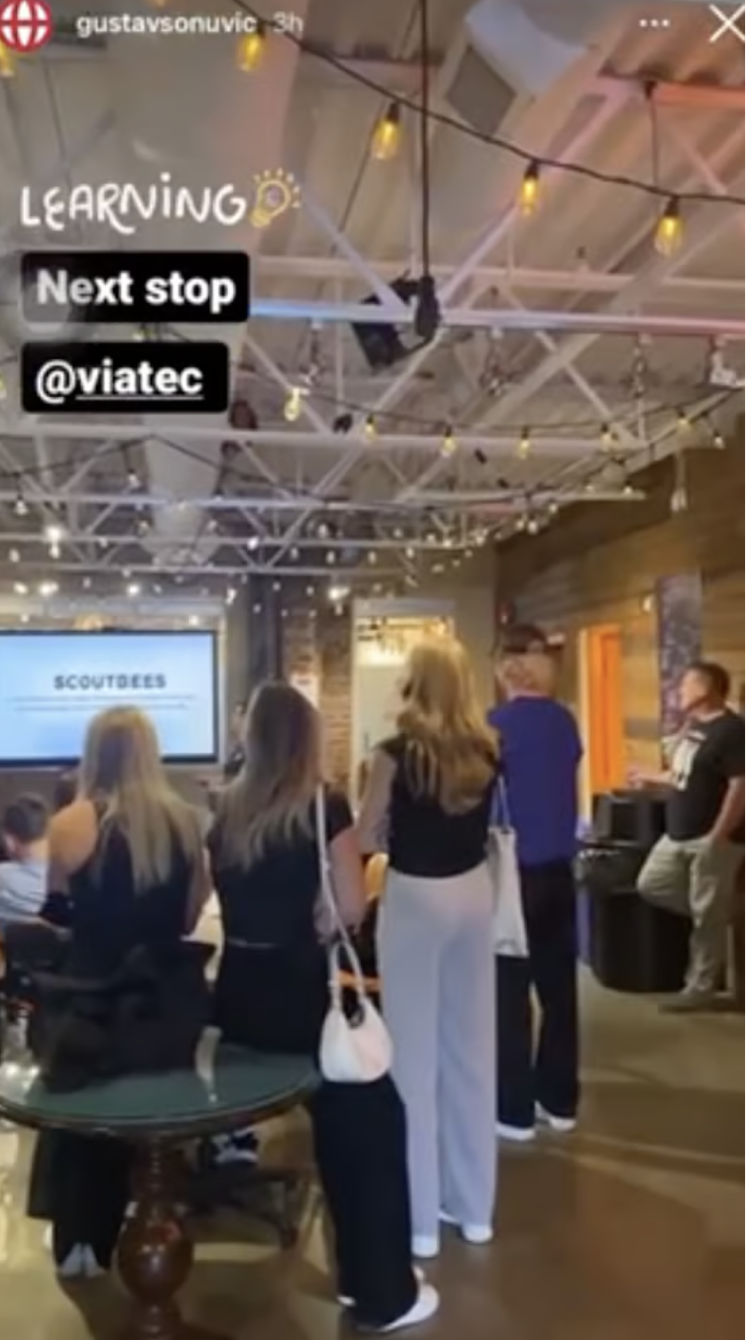Come along on a Victoria tech field trip

Come along on a Victoria tech field trip
75 UVic students recently converged on Fort Tectoria. Here’s why.
On Friday, September 8, VIATEC had 75 houseguests. But the crop wasn’t after Hors D'oeuvres or party games or a dinner party. Lessons in entrepreneurship were on the agenda. The 75, aspiring entrepreneurs from UVic, converged on 777 Fort Street for an immersive industry orientation. Their hosts did not disappoint.
Leading the enlightening session was none other than Dan Gunn, VIATEC’s CEO, who sought to enrich their understanding of the dynamic tech community with a wealth of insightful facts and invaluable knowledge. Joining Gunn on this quest was VIATEC’s member experience coordinator Rebecca Blaser and COO Rob Bennett. The team worked closely with UVic as it hosted the students, all of whom hailed from the Gustavson Business School.
Bennett detailed that one of the faculty members there, Mia Maki reached out to VIATEC in the hopes of connecting the students with the local technology industry. The aim was to reinforce the three Gustavson Business School pillars: innovation, sustainability, and equity. For VIATEC, this was a natural fit.
We do a lot of work in all three of those areas,” Bennett said. “Innovation’s even covered in the name [VIATEC stands for Victoria Innovation, Advanced Technology & Entrepreneurship Council]. For sustainability, in fact, we've got to a green-certified building. And diversity, equity, and inclusion is definitely one part of our strategy — trying to increase diversity within the tech sector and the community in general.”
Despite the natural fit, this was a first-time event. So, it felt like herding cats at times.
“This is 75 students all at one time in our building,” Bennett pointed out. “So, we were thinking we could maybe pull off a VIATEC 101 session. Dan [Gunn] does this pretty regularly. But, with a group that large, it would just be hours of talking in one place.”
The team decided to break the students into groups of 25. That way, learning would be more concentrated. VIATEC called on the Victoria tech community to support. To provide insights, but also as an exemplification of those three Gustavson Business School pillars, a pair of alumni-turned-entrepreneurs (or soon-to-be grads) were also on hand.
The first was Gaze Del Castillo, founder of ScoutBees: a local company looking to assist international students in finding appropriate housing. She is working on one segment of the local housing problem, and is hoping to expand to other cities using her unique approach for finding housing for students located in other countries.

This international focus mirrors her personal journey. Del Castillo, who hails from the Philippines, also brought experiences working for Swiss and Singaporean companies. Prior to moving to Victoria and starting up ScoutBees in September 2021, she co-founded edtech platform FilPass in her home country. Del Castillo is also a soon-to-be UVic grad who first received support from Coast Capital Innovation Centre, UVic’s on-campus incubator. Del Castillo then joined VIATEC’s Venture Acceleration Program.
Similar to Del Castillo, Lawrence Lewis has had to reroute his mail a few times. Lewis, who was also part of the proceedings when VIATEC hosted the UVic students, is from Cape Mudge on Quadra Island. He is from the We Wai Kai Nation. He brings experiences with various Indigenous communities — his own We Wai Kai Nation, Tsawwassen First Nation, Malahat Nation, Adams Lake Indian Band — to the students and his company, OneFeather.
Founded by Lewis in 2002, the Victoria-based company is a one-stop-tech-shop for Indigenous communities. Status card services, banking solutions, voting, and nation management are just some of the software solutions available. OneFeather currently supports over 270 First Nations, Métis, and Inuit communities across the country, with over 370,000 memberships managed.
The 75 students were split into three groups and navigated the day by splitting time with those two local entrepreneurs and the VIATEC team.
“So, we had those three stations,” Bennett described. “And every 20 minutes we switched them up. Man, it was controlled chaos. Every 20 minutes there are 75 kids going off in all these different directions in this wild crush of humanity. It was crazy.”
Bennett also noted that the overall vibe was a pleasant mix. Some, despite it being quite early in the school year for a field trip, were simply happy with the time away from the classroom. Others were eager to make some early connections in their careers and capitalized on the opportunity to participate in the industry and asked some great questions.
A group, Bennett joked, was most excited about taking some photos for Instagram. But he also emphasized that those creator economy leaders of tomorrow have a home at Fort Tectoria.
“We definitely got them introduced to downtown,” he said. “We showed them the space and that they can all use it if they happen to be downtown. Be our guests if they want to work in a study group or even just want to take a load off their feet. They can use the lounge to do that.”
Bennett added that there's a lot of work that takes place between VAITEC and the university. No one has yet done the study, he quipped, but, anecdotally, there are a lot of company founders — certainly company leadership — that are graduates from UVic.
“There's sort of a natural lifecycle where students start off with co-op positions or do capstone projects that connect them with industry mentors,” Bennett explained. “Then they go through university, and some might end up going away somewhere. A lot of them will come back to Victoria or those former co-op students come back to the industry.”
Bennett cited a familiar refrain that we’ve heard about the city. Those who go away remember Victoria is awesome and a safe place to raise a family. A lot of those they reacclimate themselves with UVic, too. They then become the mentors. They return to the classrooms to tell their stories.
He also expanded on the work that he and VIATEC do with the Coast Capital Innovation Centre. Bennett and Jerome Etwaroo, the centre’s director, work closely together in what he describes as a continuum.
Student teams will start out of the Coast Capital Innovation Centre or faculty members shoulder tap certain student groups to support research. That team’s idea or research often looks promising. So, maybe they want to create a company on that premise or start to license the R&D to open it up commercially. Etwaroo and his team help them get started. Once up and running, VIATEC will continue to provide it with support and resources. So, there's this natural relationship between the organization in terms of commercialization.

A major success story is Sepura Home, the creator of an under-the-sink compost disposal system. Victor Nicolov, co-founder and CEO, Nicolov detailed to Victoria Tech Journal that he founded the company after his garburator refused to gobble up discarded potato peels.
In his final year of studying engineering at UVic, Nicolov credited his professors for being able to use their labs to 3D print the first versions of the technology as he bootstrapped his way through. The Coast Capital Innovation Centre also helped him write up his first business plan.
In April, Sepura announced the completion of a $3.7 million seed round.
"[We represent] a significant step forward in sustainable living,” Nicolov said after the raise. “With its advanced technology and user-friendly design, Sepura offers a simple and effective way to minimize waste and promote a cleaner, healthier environment. We are excited to bring consumers the sustainable solution they are seeking and work to improve how food waste impacts the environment moving forward."
Other notable Coast Capital Innovation Centre alumni include VoxCell BioInnovation, which aims to provide a new platform for oncology drug screening by crafting 3D-printed, human-like tissues for drug testing; Natureblocks, a climatetech platform that automates the process for users to account for their carbon emissions and offset with carbon removal projects, as well as support carbon project developers; and MeepMeep, a smart disc golf tracker.
Bennett, a UVic grad himself, proudly shared that his company — a software outfit founded in 1982 — is still up and running. He also shouted out Cindicates’ James DeGreef and VertGIS’ Steven Myhill-Jones as alumni who have since become fixtures in the Victoria tech community. The collection of UVic alumni currently running gaming companies in the city was also fresh on my mind.
Now a new cohort, 75 strong, is ready to take this momentum and run with it. Many recognized the VIATEC team from presentations or workshops held at UVic, an impressive piece of face recognition considering it’s such early days in the school year.
“I would say that UVic is one of the better post-secondary institutions,” Bennett said. “It really engages with the industry. And I think it's great for [Victoria’s tech community] to have that sort of access. Then, it's fantastic for academia to reinforce some of the theoretical stuff with real stories from real entrepreneurs in the industry. So, it's this fantastic and symbiotic relationship that we want to continue supporting.”
Additional Info
Media Contact : Victoria Tech Journal
Source : https://victechjournal.com/p/uvic-viatec-gustavson-school